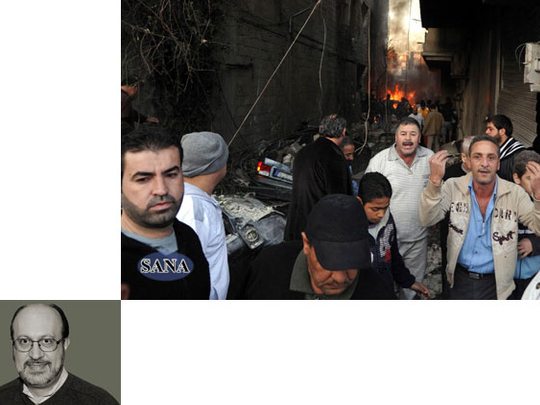
There is a major disagreement, declared Alexander Orlov, Russia’s envoy to Paris, as Moscow and Paris prepared for talks between Russian Prime Minister Dmitry Medvedev and French President Francois Hollande over the conflict in Syria. “The West says [a solution] must start with the departure of Bashar Al Assad, and we say this is where it must end.”
These were chilling words indeed for they overlooked the suffering of the hapless Syrian people and illustrated the levels of cynical diplomacy reflected in the current stalemate. A day before his visit, Medvedev slammed as “unacceptable” the recognition and support by France and others of the Syrian opposition, which further highlighted existing differences.
What will break this obduracy cycle and will Damascus emerge triumphant?
Inasmuch as Syrian troops were now bombarding targets on the outskirts of Damascus, it was safe to conclude that the nearly two-year conflict may be inching to a close, as revolutionary forces captured key facilities: Part of the military airport of Marj Al Sultan, barely 15 kilometres east of Damascus and, perhaps, the strategic Tishrin dam that straddles the Euphrates river and connects the provinces of Aleppo and Raqa.
Fierce fighting around the dam suggested that whichever side gained control over it would surely enhance its presence over a wide expanse of territory along the Turkish border. Rumours that the military airport of Deir Ezzor was about to fall would also mean a collapse of Syrian authority in the eastern part of the country.
Against such a plethora of military activities throughout the country, the international community failed to record any progress, with Lakhdar Brahimi nowhere in sight, while Russia and China continued to block UN Security Council efforts to ratchet up the pressure on Damascus. To be sure, Moscow probably realised how obsolete its position towards Syria was though it bore full responsibility for placing itself in a corner.
Of course, western powers proved to be equally confused, even if the onus was on President Vladimir Putin to show that he could handle global crises without emulating the kind of dictators that he, and the Russian people, presumably no longer wished to imitate.
Meanwhile, and in the face of the ongoing bloody revolt that showed no signs of abating, Damascus reduced its territorial ambitions to focus on the capital, the key economic city of Aleppo, as well as Alawite bastions, in the hope of riding out the onslaught. Such a calculation revealed that the regime was willing to forego most of the country’s natural resources — oil and water.
Syria’s other critical resource — manpower — was in disarray as over a million lingered in refugee camps or took flight in neighbouring countries while several million were internally displaced. Millions further suffered from daily physical threats and long-term psychological consequences.
The Syrian Arab Army (SAA), once a negligible force that recorded no victories, is now so weakened that the opposition planned a revamp, as it prepared for the day after. Nearly a third of the SAA was now either part of the Free Syrian Army (FSA) or in jail.
Regrettably, one of the reasons why the FSA failed to display earlier victories was due to the difficulty overcoming doubts among western powers, wary of providing effective anti-tank and anti-aircraft weaponry, for fear that these may fall among extremist hands in a classic blowback scenario. This was gradually addressed by the FSA itself, as the latter overcame several SAA bases, well stocked with familiar weapons.
The second element was the November 11 formation of the National Coalition for Syrian Revolutionary and Opposition Forces (NCSROF) in Doha, and which was snubbed by a number of Islamist groups in Aleppo province including the two most important, the Al Nusra Front and Liwah Al Tawhid.
To its credit, and notwithstanding the rejection by hardline elements, the NCSROF secured European and GCC recognition, and is now negotiating with opposition fighters. Of course, Iran, Russia, and China vehemently opposed such moves though they understood that the end was nearing for the Baath, even if no one could affirm whether Syria will embark on democratisation to govern itself or be challenged by extremists who preferred to transform one of the most secular Arab states into an Islamic Republic.
For now Russian officials assumed that the Sunni world would be forgiving — it won’t—as they continued to arm Damascus. Regrettably, Moscow’s hollow grandstanding overlooked the deaths of at least 30,000 Syrians, perhaps much more, and while Russian politicians were only concerned about their raw interests — naval rights at Tartus and access to the Arab world — large civilian casualties ought to mean something. In this, and sadly, the blame was similarly applicable to the rest of the international community, whose courage was limited to repeated calls to “stop the killing of innocents”, which is why the civil war lingered so long.
It remains to be determined whether Hollande will remind Medvedev that Bashar Al Assad is not Syria, and that the majority of Syrians, whose history predates those of the Franks as well as those of the Slavs, aspired to live under a regime that did not consider them mere fodder for power.
Dr Joseph A. Kéchichian is the author of Legal and Political Reforms in Saudi Arabia.











